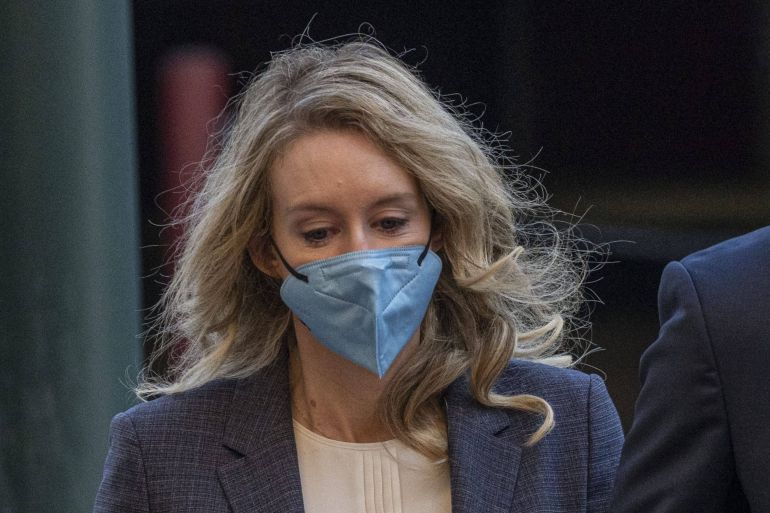Theranos trial: Elizabeth Holmes’s fate will soon rest with jury
Holmes is facing a maximum sentence of 20 years in United States prison if found guilty on any of 11 charges that she defrauded investors and patients with her blood-testing startup.

After three months and dozens of witnesses, Elizabeth Holmes’s fate is about to be decided by 12 jurors.
A defense lawyer was making his final closing argument Friday in the Theranos Inc. founder’s criminal fraud trial in San Jose, California. Prosecutors will have a chance to rebut, and then the jury can begin deliberations. Holmes is facing a maximum sentence of 20 years in prison if found guilty on any of 11 charges that she defrauded investors and patients in the blood-testing startup.
Keep reading
list of 4 itemsText messages between Elizabeth Holmes and Sunny Balwani released
Theranos trial: Founder Elizabeth Holmes testifies for third time
Theranos trial: Prosecutors rest case against Elizabeth Holmes
Holmes’s attorney Kevin Downey argued there’s a “fundamental disconnect” in the government’s claim that she intentionally deceived investors about what her startup’s blood-testing analyzers could do.
Throughout the three-month trial, prosecutors have portrayed Holmes as grossly exaggerating the capabilities and reliability of the machines she pitched to investors and business partners as revolutionary.
Downey told the jury that the government’s fixation on the shortcomings of early versions of the analyzers misses the point that Holmes was courting investors who were looking to hold onto shares for five or 10 years by telling them what she aspired to accomplish when the machines were fully developed.
“When Ms. Holmes entered conversations with investors, what was she thinking about? What type of investors did she want?” Downey said. “As you remember she testified that she was looking for people who were long-term investors.”
Closing arguments in the trial that began in early September are the last chance for both sides to sway jurors before they begin deliberating. The jury must decide whether the 37-year-old entrepreneur is guilty of fraud and conspiracy charges filed in 2018, the same year Theranos collapsed after previously reaching a valuation of $9 billion.
A federal prosecutor on Thursday used his closing argument to tell the jury that when Theranos was running out of money in 2013 and 2014, Holmes “made the decision to defraud her investors.”
“She chose to be dishonest with investors and patients,” Assistant U.S. Attorney Jeff Schenk said.
Downey sought to undercut that claim by emphasizing that investors were specifically told that there were risks in “entering a retail business that was brand new.”
He also showed the jury a graph showing that Theranos’s stock price rose from 92 cents in 2006 to $17 in 2014. He argued that investors weren’t concerned about the company’s technology. Instead, all they needed to know was that Walgreens had agreed to put the machines in its stores. It meant “a big national company” had evaluated the technology and decided to partner with Theranos, he said.
“It’s a statement that this technology company is going to be able to make its technology available,” Downey said.
The defense attorney then took on one of the government’s most damning claims at the trial: That Holmes lied by telling investors Theranos technology was adopted and used by the U.S. military. He took specific aim at tapes the government played at trial in which Holmes is describing the military’s adoption to an investor and, separately, to a journalist.
Downey noted that Theranos did indeed have multiple military contracts and told the jury, “her words track the contract language,” Downey said.
“They are being told, I think accurately, what the state of the business is,” Downey said. “This was not a fiction that Ms. Holmes was making up in her conversation” or an “exaggeration.”
Downey said the government didn’t call any witnesses from the Defense Department who could have accurately described the relationship with Theranos.
The lawyer cited the highest profile witness to testify, retired General James Mattis. When the former Secretary of Defense was asked whether he knew if the analyzer was a military success, he said wasn’t aware of it.
That’s because Mattis “recused himself from all activities with the Department of Defense,” Downey said, referring to Theranos’s business activities.
The case is U.S. v. Holmes, 18-cr-00258, U.S. District Court, Northern District of California (San Jose).